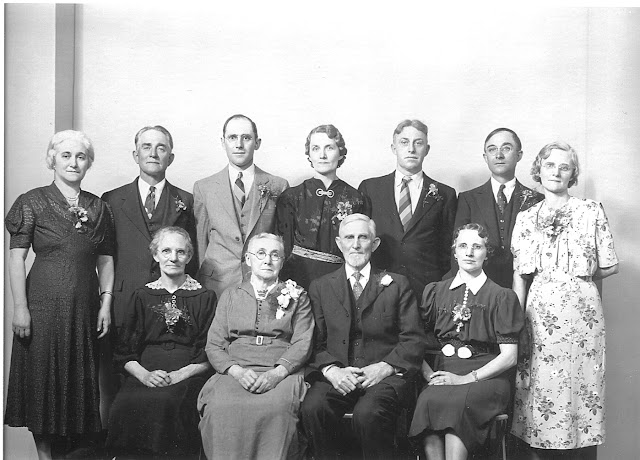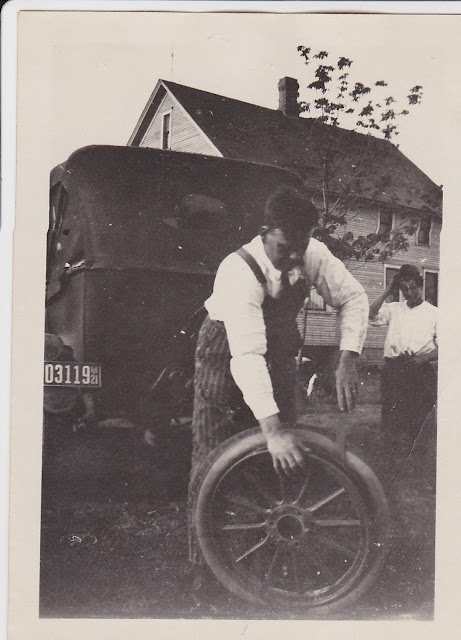John (b.6.13.1823) and Sophia (b.12.21.1819) Boeckenhauer seem to have come from several places in Germany. From Lukas, to Langen, but there was never any proof that tied them to a certain place. Not having found much access or having much finesse locating and deciphering German Documents yet, I still really didn't know where in Germany they had come from.
Which made me excited when I found their ship manifest leaving from Hamburg, and the information THEY themselves gave as where they were from was "Woggersin, Mecklenburg".
AWESOME.
 | ||
| By Heinz Kippnick; drawn by T. Rystau (de:Benutzer:Ollemarkeagle)This vector image was created with Inkscape. |
Woggersin Coat of Arms
We have our starting point.
So, from what I've been able to find, Woggersin is a small village in the "county" of Neverin in the district of Mecklenburgische Seenplatte, in the state of Mecklenburg-Vorpommern in the country of Germany.
I'll break it down with maps.
There's Germany. ------------>
She's divided into states.
That yellow state on the top right,
That's Mecklenburg-Vorpommern,
with much of it's northern border boasting
coastline on the Baltic Sea.
Mecklenburg-Vorpommern is historically a marriage of Mecklenburg and part of the Prussian province of Western Pomerania.
The State of Mecklenburg-Vorpommern seems absolutely beautiful, and you can explore it here.
Now let's go inside MeckPomm....as it's sometimes referred to....
Below is a map of its districts ....
The district of Mecklenburgische Seenplatte is circled in Blue. Inside that district, outlined in red, is the "county" Neverin. and it is inside Neverin,where we find our little municipality of Woggersin, that yellow speck I made near where Neverin splits into two portions.
Historically speaking, Woggersin is a very old town, with its first mention in written history in the year 1346, and archaeological finds as far back as 8,000 B.C.
I can't say what it was like in the late 1860's when John and Sophia left, but I gather it was a small community, as today, its population hovers only around 500 people. This is a huge jump from it's population in 1990, which rested at 90 people.
If you take a trip to the official Woggersin Website you can find a wonderful view of the town from above, plus, much more information!
 | |||
| Woggersin from above, courtesy of its municipal website |
Definitely a small German town, but remarkably, its landscape resembles any farm town here in Illinois and Wisconsin, which I'm sure had a little something to do with why our ancestors chose to settle in these places. :)
The following photos belong to Ronny Krüger, a kind person who gave me permission to use his own photos of Woggersin found on Panoramio to share with you all to give you a glimpse into Woggersin as it is today.
 | ||
| The Church in Woggersin |
I know what you're thinking.... It looks like Wisconsin, Right?!?
Okay, well, that's what I was thinking.
And it does.
Leaving Woggersin
The passage to America had to begin somewhere, triggered by something. Typically economic reasons. John Boeckenhauer was a coach driver, and I can't imagine it was easy finding in employment there at the time. This was a similar story for many, and it triggered mass emigration from Germany to America during the 1800's. There was an influx of German and Irish immigrants to America in the 1860's, and our Boeckenhauers were a part of this massive movement.
 |
| An Ad from the Shipping line the Boeckenhauer family took to America |
If John Boeckenhauer saw the advertisement, no one can say, but he and his family crossed the land, 136 miles if it's a straight shot. But a straight shot it wasn't. Just to the east of Woggersin laid difficult terrain they would have to go around, instead of pass through.The journey was likely many more miles. Today, taking a similar route they most likely took, whether to the north or to the south, in a car would take 3-4 hours. They were also traveling in October.With 3 small children. I can't imagine the trek was easy. But, they made it, and on October 25, 1865, My great great grandmother, Sophie Boeckenhauer,(b.6.20.1860) just 5 years, old boarded a ship named Bavaria, of the Hamburg-Amerikanische Packetfahrt-Actien-Gesellschaf shipping line and left the port of Hamburg with her Parents and her two brothers for America.
 |
| The SS Bavaria |
The ship was an 8 year old ocean liner of both sail and steam. Their
accommodations on the ship were in steerage. The In-between deck, The
conditions in steerage were rough and cramped. The deck normally had an
average height of 6-8 feet, and wooden bunks, one for each family, ran
along both sides of the deck, often two high. The link here shows
a typical cross section of what that steerage deck looked like.
Conditions were known for being cramped, uncomfortable and often
described as atrocious, crowded and smelling awful.
From the U.S. Immigration and Migration Reference Library, 2004 "From
U.S. History in Context" I found a passage that gave a mighty clear representation of what emigrating was like at the time for our Boeckenhauers:
It was a dangerous and difficult trip across the Atlantic. Germans began the journey by making their way to a port city. During the high peaks of emigration there was a steady flow of traffic on the roads to the ports made up of families pushing carts loaded with their belongings. In Germany, most emigrants left from Bremerhaven or Hamburg. Some made their way to Britain in the early eighteenth century, hoping to find passage to North America from there. Others went to Rotterdam, Holland, or Le Havre, France, and sought a ship there. They were often robbed or swindled when they arrived in ports.
The conditions on the sailing ships that took the German immigrants across the Atlantic were terrible. Many people could not afford to purchase a first- or second-class ticket, and so they traveled in steerage, in the lower decks of the ship that were designed to carry cargo. Aside from being miserably overcrowded, the accommodations often lacked clean drinking water and adequate toilet and washing facilities. Rats, head lice, and bedbugs were common, and infectious diseases spread quickly. In the years after, steamships would shorten the voyage and regulations on ships would correct some of the worst abuses of travelers. Even so, throughout the eighteenth and nineteenth centuries, many immigrants faced misery and even death to get to the United States. Despite the hard trip, for over a century Germans immigrated by the hundreds of thousands to the United States."
YIKES. After traveling such a distance to even get to the port of Hamburg they still had one heck of a trip to endure before they even reached America, where, when they got there, would still not be able to find respite until they reached a little town of Elk Grove, Il. A journey a family took with 3 small children, in less than desirable conditions over 4,362 miles. To make a new start in hopes of a better life. WOW. Just... wow.
So there, in Elk Grove, Illinois, over 4,000 miles later, John Boeckenhauer the Coach Driver became a farmer, and lived a long life with his wife, both of them passing away at the ripe old age of 87. Thanks to the courage of John and Sophie taking such a chance, they hopefully were able to fulfill the wishes they had for themselves and their children, as Americans.
Sophia Boeckenhauer
His daughter, Sophia, a little 5 year old girl at the time of the voyage, grew up a German-American on a farm in Illinois. She went on to have 9 children, including my great grandfather, Henry Wille (b.12.23.1889) and lived the life of a farmer's wife until the age of 96, her husband, Fritz, living until the age of 91.
I wonder how it happened that they ended up in Elk Grove Village. I wonder what contacts were made, what rumors of land they may have heard that lead them there. I suppose I will never know, but whatever it was, it was there in that village they lived long and industrious lives, bringing with them those good "Prussian Virtues" from their homeland that undoubtedly made them successful here, in America.












